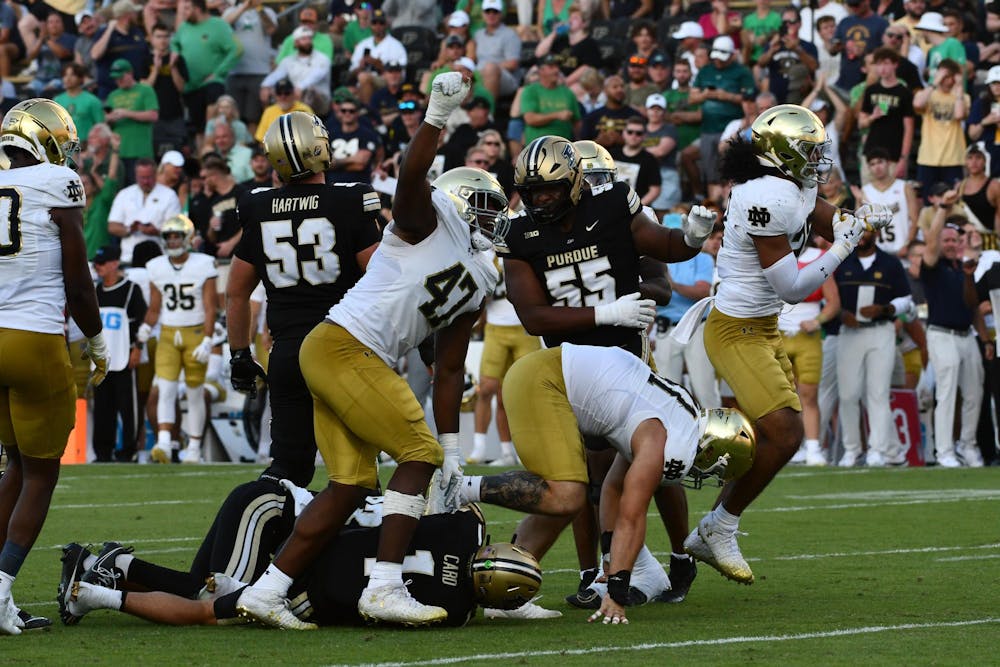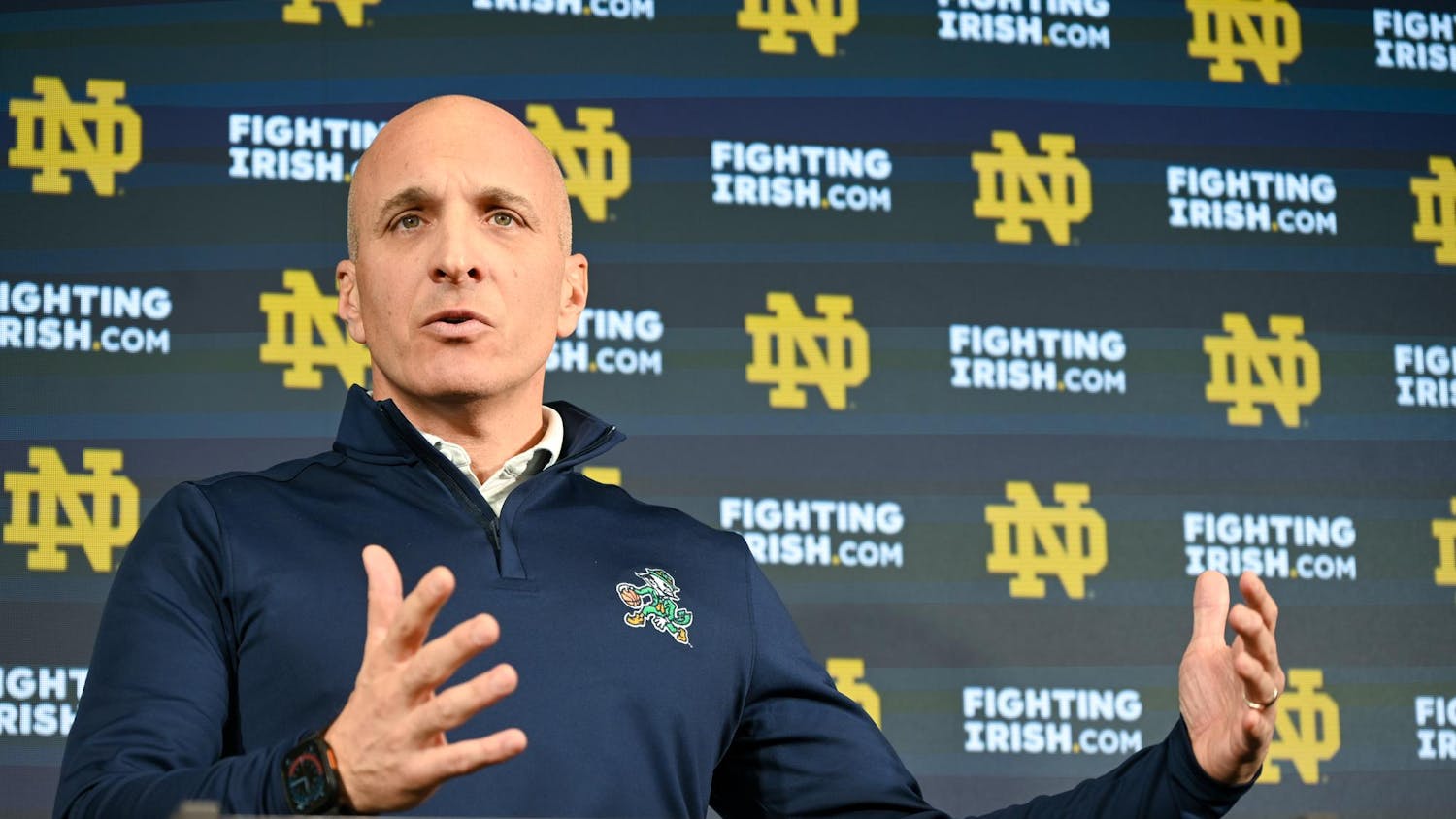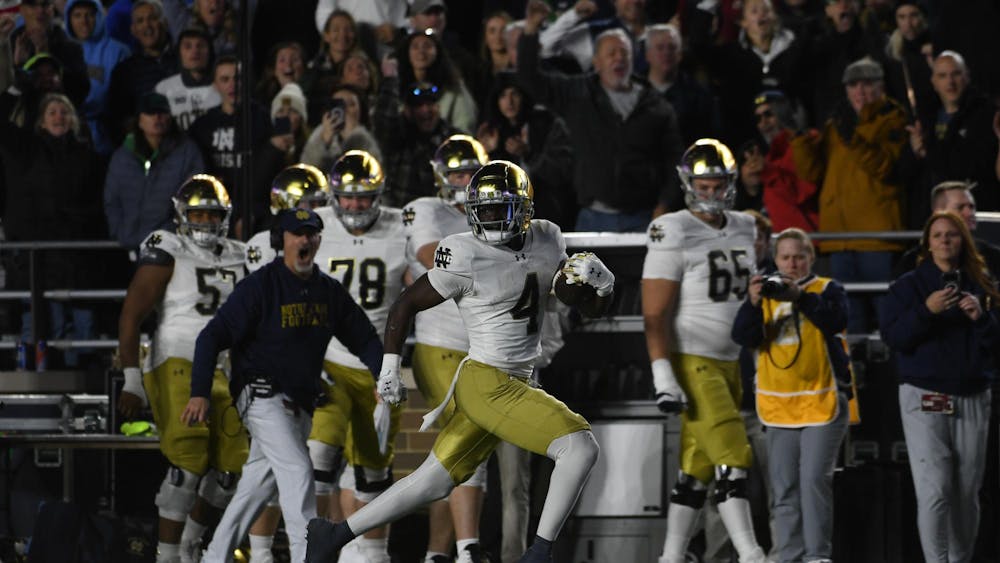For over 2,000 years, East Asians have enjoyed the communal dining experience of hot pot, cooking thinly sliced pork, kimchi and vermicelli in a simmering gochujang broth inside a large metal pot. Notre Dame graduate defensive lineman Jordan Botelho, like millions of others worldwide, loves hotpot for its convenience, comforting social experience and of course, slurping the broth at the end of the meal after it absorbed the diverse flavor profile of each ingredient. But heading into his fifth season with the Irish, Botelho traded tender, fatty pork belly for lean meats like chicken and salmon as part of his commitment to a “smarter” diet.
“They just opened a KPOT [Korean BBQ & Hot Pot with] all-you-can-eat Korean barbecue,” said Botelho, whose mother is Korean American. “I was eating there a lot, I had to give that up.”
This diet, combined with new strength and conditioning coach Loren Landow’s explosive exercise regimen, helped Botelho slim down 20 pounds over the summer to a leaner, twitchier 250 pounds. After returning from vacation for fall camp, defensive line coach Al Washington initially didn’t recognize Botelho after his drastic transformation.
“I was looking at a guy, and I didn’t know who the hell it was,” Washington said. “I got closer, and I was like, ‘Oh man!’ [Botelho] leaned out. He leaned out, and he’s in phenomenal shape. He’s stronger than he’s ever been.”
A four-star recruit out of Honolulu, Botelho always had the athleticism and drive to thrive at the collegiate level but needed greater personal accountability to garner a consistent role within the defense. Disciplinary issues kept him from reaching his potential, having been sent home by coaching staff for poor off-the-field decisions during his freshman year. Many stern conversations from then-defensive line coach Mike Elston would follow, keeping Botelho on the straight and narrow.
The strides Botelho made during the offseason to improve his conditioning and master defensive coordinator Al Golden’s demanding, NFL-style playbook demonstrated his long-awaited maturation. Botelho even overcame his notorious shyness to step into a vocal leadership role on defense, using his newfound public speaking skills to motivate teammates.
“He’s really a leader to the younger guys,” Washington said. “I think his maturation is a great story but also a reflection of his toughness. He didn’t wilt. He didn’t run. He stuck in there and believed in it, believed in his school.”
Believing he still had more to prove and could elevate his game to another level, Botelho exercised his COVID-19 eligibility extension to return as Notre Dame’s starting vyper, a hybrid linebacker-defensive lineman.
“I feel that last season, it was a great experience, but I feel like this season, I've got a lot to prove,” Botelho said before the season. “So, I feel like that's why I wanted to come back, so I can prove to everybody that I can play this game of football to a high standard.”
Through the first three games of the season, Botelho’s violent block-shedding and aggressive tackling produced 12 tackles, one sack and a team-high seven quarterback pressures. At the start of the second quarter against Purdue, the dynamic edge rusher brought down Boilermaker quarterback Hudson Card to force a punt, giving Irish fans hope that Botelho would finally record double-digit sacks this year. That hope was snuffed out just five minutes later when, attempting a speed rush around left tackle Corey Stewart, Botelho heard a pop and fell to the ground, immediately grabbing his right knee.
Though further testing would be required to confirm that pop as a season-ending right patella tendon injury, the entire Irish sideline immediately knew they had lost one of their leaders. Now, they needed to rally around him. After the Irish athletic trainers laid Botelho on the injury cart, he was surrounded by a swarm of golden helmets vowing to pray for him and play in his honor. Among them, Botelho’s backup Boubacar Traore.
“Definitely heartbreaking,” Traore said of Botelho’s injury. “He’s definitely in my prayers, too, but I told him, ‘I’m going to do it for you. Everything I do is for you from here on out.’”
The sophomore sensation gave an inspired performance the rest of the game, racking up two tackles for loss and a sack. On the very next drive after Botelho’s injury, Traore intercepted Card’s tipped pass and took it 34 yards to the house, looking more like Deion “Prime Time” Sanders than a 6-foot-4, 240 pound lineman.
An athlete among athletes, Traore possesses an elite combination of strength and speed. As Notre Dame’s new starting vyper, his burst firing off the snap lends itself to his great flexibility, allowing Traore to stay low, dip his shoulder to secure the edge against the offensive tackle and explode upward to drive him back. His agility helps him excel in back-side pursuits, a skill supplemented by his ability to change direction quickly and wrap up ball carriers in space. However, Traore can grow too dependent on his speed, leaving him at risk of being washed out by bigger, stronger, elite linemen the Irish could see in the College Football Playoff. To address this weakness, the young edge rusher said he has worked on his pass rushing technique with Washington and upper body strength with Landow.
“I definitely want to get heavier, like 250 [pounds],” Traore said. “I’m 242-243 right now, so 250-255 would be where I’d want to be.”
The onus for the defensive line to step up in Botelho’s absence does not rest on Traore alone. On the interior, senior defensive lineman Jason Onye said he knew he had to step up after Botelho exited last weekend’s contest. Onye lacks the physical tools that make Botelho and Traore special players, but compensates with flawless technique, endless hustle and a deep understanding of the game. Though he didn’t see the field much during his first three seasons, Onye said he feels comfortable taking on a larger role this season.
“I always knew I could do it,” Onye said after posting a career-high 1.5 sacks against Purdue. “Coach Washington and Coach Golden challenged me after the A&M game to put better stuff on film. You have to train and practice, put the work in during the week so on Saturday, you’re confident regardless of what happens on the field. On the field, you can’t control what happens, but you can control your confidence.”
Junior defensive end Junior Tuihalamaka will step up from third-string to backup Vyper, though Golden may get creative and try freshmen standouts Bryce Young or Loghan Thomas at the position, moving them between the interior and edge to confuse defenses. Regardless of the defensive line rotation Golden chooses, he should know that every single one of them will hustle to their last breath to honor their injured teammate, practice or game.
“We’re as motivated as ever to play fast and do it for [Botelho],” Onye said. “We know if he was on the field he would be right there with us, so we’re motivated playing for him, playing the rest of the season out for Jordan. This is for you, bro.”









